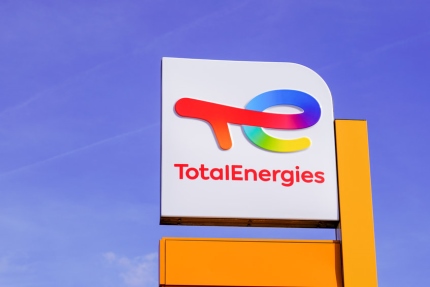“Big Oil” is the term used to describe the world’s six largest, publicly-traded oil and natural gas producers—BP, Chevron, Italy’s Eni, ExxonMobil, Shell, and TotalEnergies. Of the Big Oil companies, France’s TotalEnergies (TTE) is perhaps the most interesting of the world’s major oil companies. Here’s why…

On the one hand, TotalEnergies has yet fully exit its holdings in Russia, and it is involved in a controversial gas project in Mozambique. But on the other hand, it is the furthest along among the oil giants in the transition to renewable energy. And, its stock is cheapest among the oil majors, with a dividend yield of 5% as a perk.
Let’s now take a closer look at the company.
TotalEnergies
On April 28, the company reported strong first-quarter results thanks to higher oil and gas prices, wider refining margins, and strong trading results. TotalEnergies’ adjusted earnings of $9 billion exceeded market expectations and improved from $3 billion last year.
TotalEnergies’ integrated gas and renewable power adjusted operating income improved to $3.1 billion from $985 million the year before, thanks to higher LNG prices and strong results from LNG and electricity trading. This segment of its business has turned in a string of strong quarterly results.
The adjusted earnings excluded a $4.1 billion impairment charge related to the Arctic LNG 2 project in Russia, a fine given to TotalEnergies due to sanctions prohibiting the export of any liquefied natural gas technologies that benefit Russian companies.
Despite the charge, TotalEnergies said it would buy back up to $3 billion of its shares in the first half of 2022, up from a previous $2 billion target. And, it confirmed an interim dividend increase of 5%, to €0.69 ($0.74) per share.
That all sounds like results from a typical major oil company. But here is where TotalEnergies is different…
TotalEnergies’ Unique Net Zero Plan
The company’s unique strategic plan aims to achieve net zero emissions by 2050, while delivering near-term financial performance in the event of a lower-oil-price environment.
TotalEnergies’ emissions reduction goal is similar to most of its European oil peers. But, in contrast to others, TotalEnergies does not plan a quick retreat from oil and gas through divestment. Instead, it plans to reduce its emissions over time by expanding its ownership of renewable power and low carbon assets.
For example, in the downstream segment, the company has already started to move away from oil products with the conversion of its La Mede refinery in France to a renewable diesel production facility. Conversion of the Grandpuits refinery in France to produce renewable diesel and bioplastics is set to follow in 2024.
Together with co-processing facilities at other refineries in Europe, the U.S., and Asia, TotalEnergies expects to produce 100 thousand barrels of renewable diesel per day by 2030. Between now and then, the company expects oil products to fall to less than 30% of its sales mix, with 50% coming from gas and 15% from electricity.
TotalEnergies expects to grow gross renewable generation capacity from about 10 gigawatts (GW) today to at least 35 GW by 2025, as the company invests about $3 billion per year, or just more than 20% of its total 2021 spending. Current and planned capacity is primarily in solar, but the company is pushing further into floating offshore wind, comprising 40% of planned growth. TotalEnergies expects its integrated renewable and electricity portfolio to be net cash positive before 2030.
Related: The Next Winner From the U.S. LNG Sector
The Big Move into U.S. Renewables
The focus of the TotalEnergies’ renewable energy push seems to lie right here in the U.S.
The company has been building up its U.S. renewable assets in the past year, with a portfolio that includes eight gigawatts of large-scale solar projects bought from SunChase, the recent acquisition of Core Solar, and the development of 4GW of wind projects off the coasts of New York and North Carolina.
Then, on May 25, TotalEnergies made its biggest U.S. renewable power purchase yet with an investment in wind and solar farm developer Clearway Energy Group, which itself holds a 42% economic interest in Clearway Energy Inc (CWEN and CWEN.A). This company controls the generating assets once they become operational.
The company said it would take a 50% stake in Clearway and partner with its owner, infrastructure fund GIP (Global Infrastructure Partners), in a deal worth $2.4 billion. GIP will receive $1.6 billion in cash and a stake of just under 50% in SunPower (SPWR), one of TotalEnergies’ subsidiaries. SunPower is the second-largest operator of U.S. residential solar.
Clearway is the fifth-largest renewables operator in the U.S., with eight gigawatts of wind and solar assets operating and a further 25GW project pipeline. That fits with TotalEnergies’ aforementioned energy transition plans, moving from its current 10 gigawatts of renewable capacity to 100 gigawatts by 2030.
TotalEnergies’ Outlook
I believe TotalEnegies stock is the cheapest of the oil majors.
Here is what the Financial Times’s Lex column analysts said: “With the market squarely focused on record profits from fossil fuels, underperforming Total shares are an opportunity. The one-third discount on forward earnings to the sector represents a failure to recognize that [energy] transition efforts will return into focus as the oil boom fades.”
And here is what Morningstar said about the company’s dividend: “Combined with relatively low leverage, Total’s payout is one of the safer in the sector, despite one of the highest yields while being supplemented with repurchases.”
Keep in mind that TotalEnergies was one of the few oil majors to maintain its dividend in 2020.
The stock is a buy anywhere around $60 a share, with a gain expected by me of 20% over the next year.





